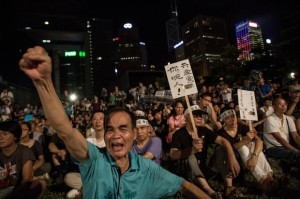DAVID SCHLESINGER, MEI FONG, NICHOLAS BEQUELIN 09.02.14
Lam Yik Fei/Getty Images
Pro-democracy protestors hold up a sign (center) reading: “Chinese Communist Party: You Lie!” They gathered in front of the Government Offices in Central, Hong Kong, on August 31, 2014, after the National People’s Congress Standing Committee of the CCP in Beijing endorsed a framework for political reform that rules out open nominations by the people of Hong Kong in local elections.
David Schlesinger:
Hong Kong’s tragedy is that its political consciousness began to awaken precisely at the time when its leverage with China was at its lowest ebb.
Where once China needed Hong Kong as an entrepôt, legal center, financial center, talent center, and education center, now the situation is reversed. Hong Kong is dependent on China—without Chinese deals Hong Kong’s law firms, investment banks, and private equity players would swiftly relocate elsewhere; without Chinese tourists Hong Kong’s hotels and shopping emporia would shudder and shutter; without Chinese-linked opportunities Hong Kong’s young people would face under- or unemployment.
Hong Kong went through 150 years of relatively benign colonial rule by Britain without London ever creating true democratic consciousness or institutions and without Hong Kong ever truly demanding more of a say in its administration. Hong Kong’s business elites vied for British favor and awards, from business monopolies to the sovereign’s bestowed knighthoods.
China surely counted on the change of suzerain leading to a simple change of focus from London to Beijing—and, frankly, in the case of many in the business and political elite that’s exactly what happened.

